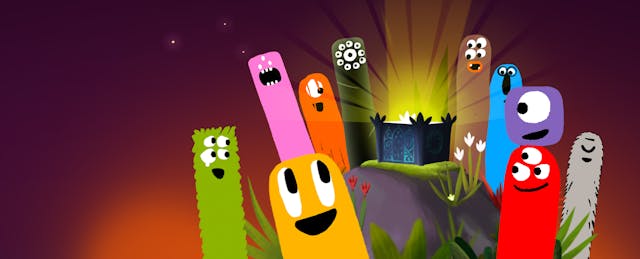Kahoot is best known for its digital quiz tools that can turn the classroom or corporate office into a raucous quiz show. But there is no question about how it plans to grow. Last December, following a Disney investment that valued the company at $376 million, the Oslo-based company made clear its intention to build a pipeline for acquisitions.
Today, Kahoot followed through on that plan. For the first purchase in the company’s 8-year history, it will acquire Dragonbox, which offers a suite of math educational games, for $18 million in a cash-and-stock purchase.
Launched in 2012, DragonBox won early acclaim with a pair of apps that use puzzles to teach algebraic concepts, and without the explicit use of numbers and arithmetic symbols. (We reviewed the games several years ago.) These titles racked up dozens of media accolades and industry awards, from organizations that include Common Sense Media and Games for Change, an industry association for serious game developers.
The company has since expanded its collection of games to cover other math skills, from number sense to geometry proofs. There’s also a chess game it developed with a grandmaster and current world champion, Magnus Carlsen. Altogether, DragonBox offers six apps that have amassed about 1.5 million downloads, estimates Jean-Baptiste Huynh, the company’s founder and CEO. Each app is available only via purchase, priced at $4.99 and $7.99.
In addition to those consumer offerings, DragonBox has been piloting and developing full math curricula for use in schools in Finland, France and Norway, where the company is based. The program includes tablets and apps, along with print workbooks, lesson plans and physical manipulatives aligned to national academic standards. It has been piloted with more than 1,000 students, but Huynh kept mum on how many schools and classrooms have formally adopted this program.
For its school product, DragonBox is focusing on those three countries at the moment. The U.S. is a possibility, Huynh says, but he points to the test-centric mindset of American schools as a cultural difference that could pose obstacles. “We have a Nordic philosophy that puts the child at the center and focuses on exploration, play, discovery and building intrinsic motivation,” he claims.
With Kahoot and DragonBox both based in Oslo, and founded around the same time, officials from the two companies naturally crossed paths over the years. Shortly after Kahoot launched its partnership and investment program, Ignite, last December, DragonBox was among the first to join, according to Kahoot CEO Åsmund Furuseth. Soon after, conversations began that eventually led to today’s deal.
Says Huynth: “We have content that delivers great value to our users, which complements the distribution channels and users that Kahoot has.” And with gaming as core to both company’s DNA, “there is a good match between our philosophies.”
Kahoot offers a web-based and mobile app that allows anyone to create and partake in multiple-choice quizzes. According to its most recent financial presentation, more than 178 million games were hosted from 13 million unique accounts during the 12 months prior to March 2019.
The company also earned $1.9 million in revenue in 2018, most of it from monthly premium subscriptions that it sells to schools (for $1 per user in K-12, and $10 in higher ed) and businesses (which cost $10 to $40 per user). The company currently has about 70,000 paid accounts, the majority of which come from its corporate customers. Kahoot also generates revenue from allowing publishers to sell their content on its platform.
No changes are currently planned for DragonBox’s consumer and school offerings. All of its 25 employees are expected to join Kahoot, adding to its current headcount of 60.
To date, Kahoot has raised $63 million in investment capital. Expect more deals to come. There are “several ongoing M&A processes with global potential” in the works, according to the financial report.


